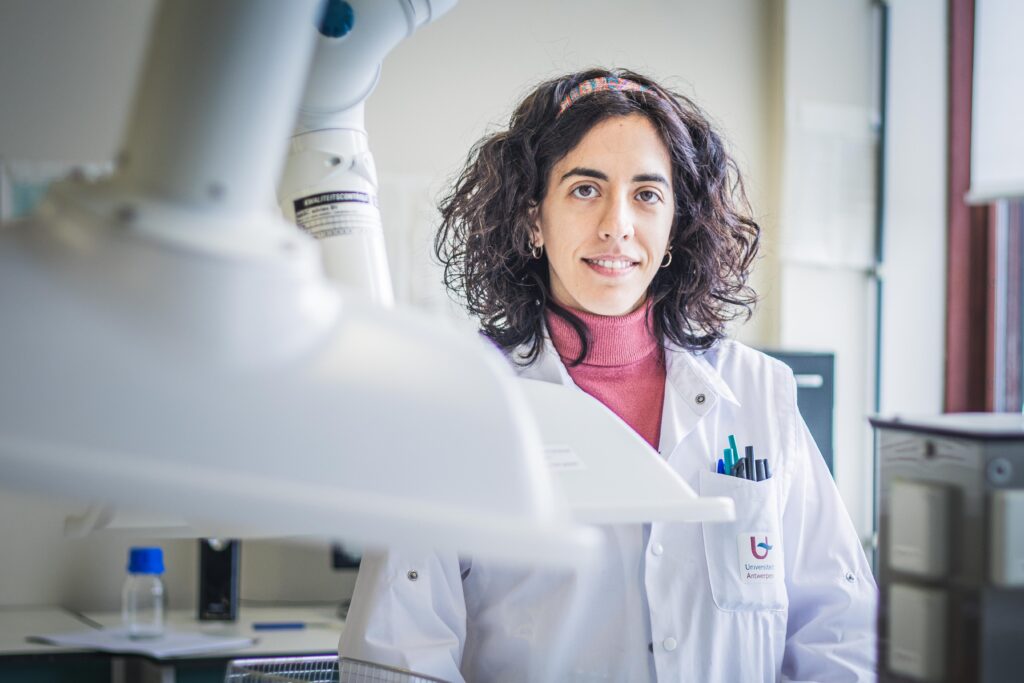
Dr. Vanesa Nozal García, from Valladolid in Spain, works as a postdoctoral researcher at the University of Antwerp. Under supervision of Professor Pieter Van Der Veken in the Laboratory of Medicinal Chemistry, she researches Acute Myeloid Leukemia (AML) and focusses on a new methodology: targeted protein degradation.
As an international researcher, what has been your experience living here in Antwerp? Can you share some highlights or even challenges that you’ve faced here?
“Starting here as an international researcher has been remarkably smooth, largely due to the proactive involvement of various departments at the University of Antwerp that are dedicated to welcoming foreign researchers. Also, Antwerp is an international city. So it’s easy to go out and meet new people as many people speak English. I was fortunate that I obtained funding for my postdoctoral fellowship at the start of my stay here. This has enabled me to really focus on my research, without having to worry about securing postdoctoral funding in the future.”
Sometimes it can be tricky to obtain funding to do a postdoctoral fellowship in a different country. Do you have any advice or tips on how best to go about looking for and obtaining funding for postdoctoral fellowships abroad?
“You need to take your time. I like to start by exploring funding opportunities at smaller, regional funding agencies and to then gradually expand my search to larger ones. For example, in Belgium, you could first look into funding opportunities from the Flemish government. Then you could check if there are any national funding agencies that could fund your work. After that you can look at funding opportunities at a European level. Also, let’s say that you’re researching a particular disease, such as amyotrophic lateral sclerosis (ALS) or AML, then there are specific foundations that are focused on these diseases and sometimes they provide postdoctoral research funding. At the University of Antwerp, we receive a lot of newsletters summarizing many of the funding opportunities. So that’s often a great place to start looking for funding. You could also approach it differently. For example, if you’re interested in working with a specific researcher or lab, you could contact them and enquire about potential funding opportunities that you could apply for to join their lab. You could also start a collaboration with them and see if this could lead to further opportunities.”
Why did you choose to work in Professor Pieter Van Der Veken’s lab at the University of Antwerp to do your postdoctoral fellowship?
“During a symposium in Nice in 2021, I met some researchers from his lab and I was amazed by the good atmosphere amongst them. I was looking for a new lab to join and then found out that there was an open position in his lab. Prof. Van Der Veken was working on a project that I was interested in, so it was a good match for me. After I moved to Antwerp, I experienced that this is a great lab to work in because Prof. Van Der Veken provides a lot of support and it’s very interesting to discuss new ideas with him.”



Doing medicinal chemistry experiments in Prof. Van Der Veken’s lab.
Could you explain to us what exactly it is that you’re researching?
“I research acute myeloid leukemia, or AML. This is a type of cancer that is quite deadly. At the moment, the treatment options are limited. Together with a colleague, I am focusing on a new methodology, a new type of therapy called targeted protein degradation.
Some medications work by targeting a specific protein and they can switch this protein’s function off, if needed. If a protein is not functional, it will be turned off. In 2002, researchers discovered a new method. You can tag a protein that’s not working and tell your own cell machinery to completely remove this protein. It will not be turned off, but it will be removed from your cell. My research is trying to understand the consequences of completely removing these types of proteins, rather than only blocking them.”

Collaboration is often very important in scientific research. Could you tell us about some collaborations that you’re currently involved in and how you find collaborations beneficial to your work?
“In organic chemistry and especially in medicinal chemistry, it’s often very important to collaborate with biologists. For example, a medicinal chemist could have expertise in chemical synthesis and a biologist may have knowledge about biochemical or cellular assays. For my project, we’re collaborating with Prof. Ingrid De Meester from the Medical Biochemistry lab. Her research group has various cell cultures available that we can use to test our compounds.”
What excites you the most about your research now and where do you hope to take it in the future?
“I really like the field of targeted protein degradation because it’s a new methodology and I want to see how it compares to the more traditional drugs. My dream would be to combine this new methodology with my background in neurodegenerative diseases, which was the topic of my PhD. At the moment, this methodology is largely focused on cancer and it would interesting to see if this could also be applied to brain disorders.”
What advice would you give to aspiring researchers that are interested in a career in medicinal chemistry?
“I think that you need to go step-by-step and eventually you will find the place where you belong. It’s very important to find a supervisor that suits you. You need to not only get along professionally, but also on a personal level. Additionally, having sufficient funding to carry out your research is also vital.”
Article written and edited by Dr. Bronwen Martin and Teun De Voeght.
